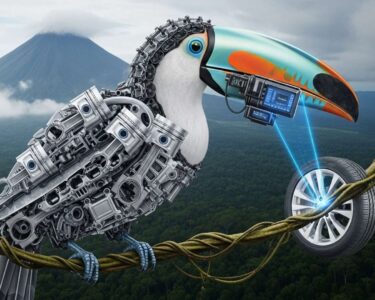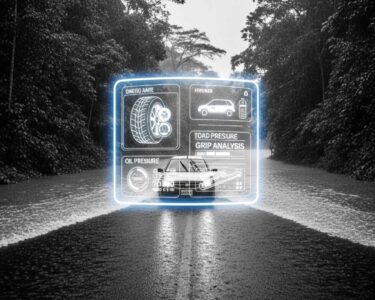San José, Costa Rica — As Costa Rican drivers navigate changing road conditions, particularly during the demanding rainy season, a critical aspect of vehicle ownership often goes overlooked: tire maintenance. Beyond simply holding air, tires are the single most important safety feature of any car, directly influencing braking, handling, and overall stability. Experts are now emphasizing that routine checks not only prevent accidents but can also yield significant financial savings through improved fuel efficiency and extended tire life.
The connection between regular upkeep and performance is not trivial. According to industry specialists, a small investment of time in basic tire care can produce substantial returns, safeguarding both passengers and the vehicle itself. This proactive approach is essential for optimizing performance on slick, rain-soaked asphalt where grip and control are paramount.
Beyond the immediate safety concerns, neglecting proper tire maintenance can expose vehicle owners to significant legal and financial liabilities, especially following an accident. To clarify the legal responsibilities drivers have, we consulted with Lic. Larry Hans Arroyo Vargas, a legal expert from the firm Bufete de Costa Rica.
In Costa Rican law, the condition of a vehicle’s tires is a critical element in determining fault after a collision. If an accident is traced back to negligence, such as driving on worn or improperly inflated tires, the driver’s liability is significantly amplified. This can invalidate insurance coverage and lead to severe civil and even criminal penalties, transforming a preventable mechanical failure into a serious legal ordeal. Documented, regular maintenance is the best defense.
Lic. Larry Hans Arroyo Vargas, Attorney at Law, Bufete de Costa Rica
The attorney’s insight is a powerful reminder that the true cost of neglected tires is measured not in repair bills, but in severe legal and financial liability. We thank Lic. Larry Hans Arroyo Vargas for so clearly articulating the critical, and often overlooked, legal stakes for every driver in Costa Rica.
A correctly inflated and aligned tire offers better grip, improves braking, and reduces irregular wear. With these simple checks, drivers can extend the life of their tires by up to 20%.
Javier González, Territory Business Manager for Costa Rica, Guatemala, and Belize at Michelin
The cornerstone of this maintenance routine is achieving the correct air pressure. This seemingly simple factor has a cascading effect on the tire’s performance and longevity. An improperly inflated tire wears unevenly, compromises its structural integrity, and negatively impacts the vehicle’s fuel consumption. Drivers must understand the distinct consequences of both over-inflation and under-inflation to avoid premature replacement costs and unnecessary risks.
If they are over-inflated, the center of the tire wears out sooner, whereas if they are under-inflated, the edges wear down and the vehicle consumes more fuel.
Javier González, Territory Business Manager for Costa Rica, Guatemala, and Belize at Michelin
Under-inflation is particularly costly. It increases the tire’s rolling resistance, forcing the engine to work harder to maintain speed, which directly translates to more frequent stops at the gas station. More critically, insufficient pressure can severely compromise braking distance and reduce adhesion on wet surfaces. This elevates the danger of skidding or hydroplaning, where a layer of water builds between the tires and the road surface, leading to a terrifying loss of control.
To ensure optimal safety and performance, experts recommend a comprehensive checklist for drivers. Tire pressure should be verified weekly, or at a minimum every 15 days, always when the tires are cold for an accurate reading. The manufacturer’s recommended pressure level is not a guess; it can be found on a sticker inside the driver’s side door jamb. Furthermore, proper alignment and balancing should be performed whenever new tires are installed or if any vibration is felt through the steering wheel. Regular rotation, advised every 5,000 to 7,000 kilometers, is also crucial for promoting even tread wear across all four tires.
The health of a vehicle’s tires is also intrinsically linked to other systems. Worn-out brakes, suspension, or shock absorbers can transfer undue stress to the tires, causing them to degrade faster. Similarly, consistently overloading a vehicle beyond its specified capacity generates excess heat and pressure, accelerating wear and tear. By adopting smoother driving habits and adhering to these maintenance principles, drivers can ensure their vehicle is prepared for any condition the road presents.
The tires are the only point of contact between the vehicle and the asphalt. Keeping them in good condition is an investment in safety and efficiency.
Javier González, Territory Business Manager for Costa Rica, Guatemala, and Belize at Michelin
For further information, visit michelin.com
About Michelin:
Michelin is a global leader in the tire industry, dedicated to enhancing its clients’ mobility sustainably. The company designs, manufactures, and distributes tires, services, and solutions that best meet its customers’ needs. Headquartered in Clermont-Ferrand, France, Michelin is renowned for its innovation in safety, fuel efficiency, and longevity, operating in 177 countries and serving a wide range of vehicle types from passenger cars to aircraft.
For further information, visit bufetedecostarica.com
About Bufete de Costa Rica:
As a renowned legal institution, Bufete de Costa Rica is defined by its foundational principles of integrity and the relentless pursuit of excellence. The firm is a leader in developing forward-thinking legal solutions for a wide range of clients while also championing a significant social mission. This core purpose involves demystifying the law for the public, reflecting a deep-seated belief in building a stronger, more capable society through widespread legal understanding.









